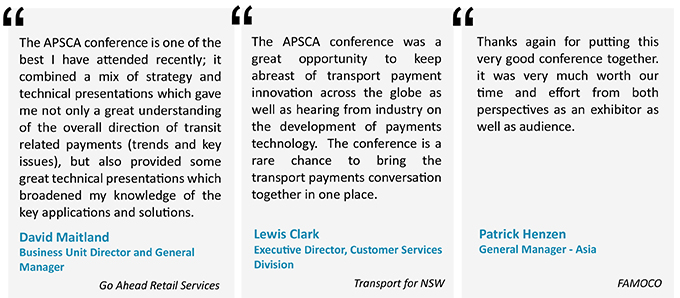Transport Payments Asia Pacific, organised by APSCA, hosted by the National Payment Corporation of Vietnam (NAPAS), and supported by the State Bank of Vietnam and the World Bank, was held in Hanoi on 6-7 June 2018, Vietnam.
The conference provided the region's best opportunity to discuss the significant changes taking place in payments for public and private transport services for customers. Some key conclusions from the conference are highlighted below.

Transport Payments Asia Pacific was attended by over 220 delegates from 19 markets in Asia Pacific, South Asia, Europe, North America and South America. Over 50% of delegates came from transport authorities, transport operators, transport ticketing schemes, and from banks, payments schemes and payments services providers. Conference participants from both end-users and industry reflected the growing convergence between transport payments and retail payments and the increasing acceptance of open-loop payments in transit.


From transit ticketing to transport payments
Presentations and discussions made it clear that the business of transport revenue now has much more to do with transport payments and acceptance than it does with transport ticketing. It looks increasingly likely that the phrase "transport ticketing" will become outdated in a world moving towards new concepts such as on-demand transport and mobility-as-a-service.
Seamless payments in transport
The subject of interoperability and ensuring that payment systems for public transport systems are integrated was highlighted again in Vietnam. Improving customer experience is essential for increasing public transport modal share and there is no better way than making ticketing and payments frictionless or invisible. ABT can help but is not a complete solution to missing interoperability.
Enough about TfL already!
The conference made it clear that there are now more recent and more useful case studies of EMV contactless payments in transit than the well-worn TfL story. Latest implementations of accepting open-loop payments in transit are not only more relevant for many transport authorities and operators than the London implementation but also have new findings and lessons learned.
Real ABT (beyond EMV contactless)
The conference followed up the recent APSCA-Snapper webinar by exploring the bigger picture of account-based ticketing with multiple closed-loop ID media options, OEM and Internet mobile payments, as well as EMV contactless payments. Asia has often had innovative approaches to transport payments and it looks likely that the future roadmap of ABT has much to learn from this region.
Tickets are not part of the future
In the future customers are more likely to pay for journeys, or their entire monthly travel, than to purchase tickets. Whether they pay as they go for those journeys or whether they book and pay for the journey in advance, a "transport ticket" may not be part of the process. Both of these payments are likely to be made from an account, either with the mobility provider or an external funding source.
Media-centric to server-centric
When the company that invented contactless transport media makes a presentation about cloud-based ticketing and virtual transport tickets then the ground has really shifted. There is now an inexorable transition from front-end to backend in transport payments systems that includes media as identifiers, thinner infrastructure, ABT, mobile ticketing, ticketing-as-a-service and MaaS.
Integrating public and private transport
Mobility-as-a-service (MaaS) and shared mobility were perhaps the most thought-provoking subjects discussed but which today still have more questions than answers. Customers make door-to-door journeys which public transport rarely supports. The most interesting aspect of MaaS is how to best integrate public and private transport services, particularly for on-demand transport, to give customers the services they need.
New thinking about transport payments
As the birthplace of contactless AFC and smart integrated ticketing, Asia has led in the development of transport payments services for customers. The unique commercial focus of Asian transport authorities and operators on maximizing revenue from public transport, as well as driving cost efficiencies, is in stark contrast to the U.S. and can even surprise transport experts from Europe.
 Click here to see more photos.
Click here to see more photos.



